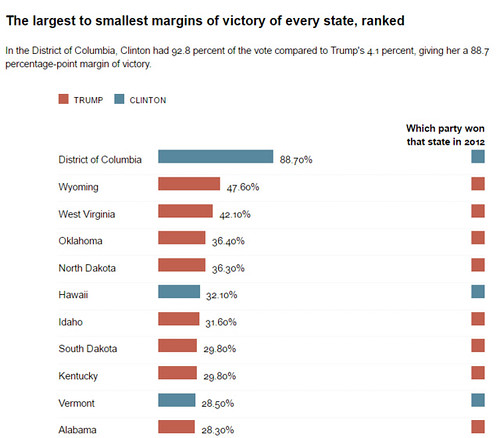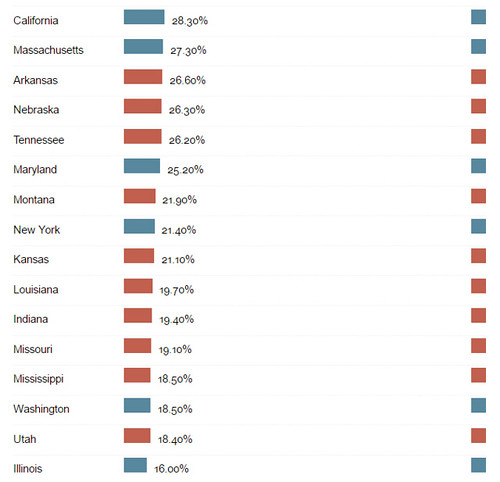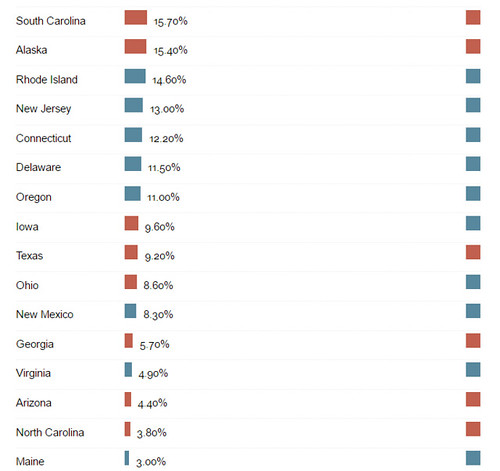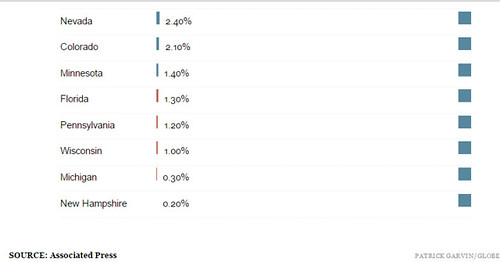Rope a Dope and the next six years for progressives | Playing the long game
There have been a lot of articles hand wringing about the impact on the Republican Party of Donald Trump's campaign.
Now that he has been elected there is still some remonstration, but I think we've been misled, despite the concerns of compassionate conservative columnists like David Brooks and Michael Gerson.
After all, the Donald Trump candidacy is the logical extension of the Republican program dating to the Clinton years and continuing forward through the Tea Party/race-based reactions to the Obama Administration. But it's not an end game.
The game is longer than we could possibly imagine, e.g., read about the anti-New Deal campaign against FDR in the book When Washington Went to War. That was 80 years ago.
There's an important article in The Nation by James Nichols, "It really is that bad," making the point that with control of Congress and the Presidency (and the Supreme Court), the GOP is likely to be already planning a kind of blitzkreig comparable to Wisconsin Governor Scott Walker's attack on unions and other matters immediately after taking office in 2011.
From the article:
The Republican president will have what Walker and many other Republican governors had who were elected in the “wave” year of 2010: “trifecta” control of the government, with GOP dominance of the executive branch and both chambers of the legislative branch.Now is the time to be sure you're reading-subscribing to The Nation, In These Times, Progressive Magazine, etc. (I have never been hard core enough to read the New Statesman, New Left Review, and Monthly Review regularly, but maybe it's time to start.)
Make no mistake, Trump now leads the Republican Party. And that party has in recent years developed an approach to power. When it does not control the executive branch, the GOP obstructs the Democrat who is in charge. When it has the executive and legislative branches in its grip, the GOP acts. Quickly.
Despite the whining of “Never Trump” conservatives that the Republican nominee was politically impure, Trump accepted the nomination of a socially and economically conservative party that spelled out its agenda in a platform that People for the American Way’s Right-Wing Watch recognized as a more extreme version of the party’s previous programs: “a far-right fever dream, a compilation of pouting, posturing, and policies to meet just about every demand from the overlapping Religious Right, Tea Party, corporate, and neo-conservative wings of the GOP.”
Gingrich correctly noted that the platform on which Trump was elected outlines an aggressive anti-labor agenda that parallels the worst of what Walker and other members of the GOP’s “Class of 2010” implemented in the first months of their tenures. The new president has criticized minimum-wage laws and supported anti-union “right-to-work” laws. Only fools would doubt that his fiercely anti-labor vice-presidential running mate, Indiana Governor Mike Pence, will hesitate to implement the agenda (as a defining player on domestic policy) just as quickly as did Walker. Nor should they doubt any of the other outlandish and extreme commitments made by Trump during what the new president described in his victory speech as a “nasty” and “tough” campaign. Trump will have skilled and experience allies, not just in Pence but in House Speaker Paul Ryan and Senate majority leader Mitch McConnell.
So when I read an article like this one, "Inside a divided GOP, 'real anguish' over the way forward," from the Washington Post instead I am thinking that despite writings in the National Review and elsewhere about Trump's destruction of Good Old Party principles, as of yesterday, the House and Senate Leadership are very very busy, not figuring out the "future" of the Republican Party but planning for the very near term, their First 100 Days agenda. And they are ecstatic.
The agenda is likely to be focused on tax reduction for the wealthy, keeping the "carried interest" deductions for hedge funds, pushing back regulatory actions of various sorts, especially concerning the environment, overturning the Affordable Care Act, and whatever other areas of policy and practice are particularly of interest to various powers that be, plus nominating and confirming a new, very conservative, Supreme Court Justice.
That being said, while before the election I was terrified reading articles opining about the 2020 election, after reading the Nichols piece, now I realize how despite election fatigue, just as various conservative interest groups have been focusing on the long game ("Republicans hold on to state legislative edge in U.S. election," Yahoo; ALEC's Influence over Lawmaking in State Legislatures, Brookings Institution), the same needs to be true for progressives.
1. Congressional elections in 2018: Start now. Certainly, the likelihood of Congressional and Presidential overreach in 2017 and 2018 sets the stage for mid-term election losses for the Republicans.
Can enough House seats be picked off to create a Democratic majority? Not if planning hasn't already started. But in the 2016 election, John Mica (a conservative Republican big on transportation issues) lost his seat in Florida. Darrell Issa came very close to losing in Suburban San Diego. Maggie Hassan won the Senate race in New Hampshire.
Even though Senator Richard Burr and Donald Trump cruised to victories in North Carolina, the extremist Governor Pat McCrory appears to have lost, but by an amazingly thin margin, less than 1,000 votes.
2. Focus on State Legislatures in advance of redistricting for the 2022 elections because this shapes districting for the House of Representatives. The same goes for state elections, because after the 2020 Census, there will be redistricting.
State governments controlled by Republicans have been sure to draw Congressional and state legislative districts in ways that favor conservative interests, and that ends up producing the hyper partisan House of Representatives "in Washington"
This Boston Globe article ("With Hassan victory, N.H. turns another shade blue") has a chart (reprinted at the bottom of this entry) showing the margins of victory, state by state, for either Clinton or Trump. There are opportunities.
3. As well as the structure of State Legislatures which for the same reasons also produces districts that favor conservative, rural and exurban interests over urban areas. Urban areas, even suburban areas, tend to be Democrat -- e.g., Loudoun and Fairfax Counties in Virginia voted a majority for Hillary Clinton, as did most of the Hampton Roads area of Virginia, despite heavy military presence and the same is true for counties like San Diego and Orange in California, which historically have been known for support of some of the most conservative movements in the US (John Birch Society, etc.).
4. The 2020 Presidential Election matters starting now. If there are a lot of blitzkreig type actions under a President Trump-McConnell-Ryan Administration there will be a great deal of anguish and response on the part of many people, not just from "the left," but also the center and all the disaffected people who voted for "change" but will find out the change they voted for doesn't help them all that much.
Attempts to overturn Wisconsin's conservative agenda not working out for progressives. Progressive attempts to counter Scott Walker forces haven't been particularly successful in Wisconsin--not only did Trump win the state's vote but former Senator Feingold lost pretty decisively in his bid to topple Senator Ron Johnson--I aver this is in large part due to the fact that the state isn't particularly "urban."
While progressive forces haven't been particularly successful in Wisconsin that hasn't been the case in Kansas.
Kansas shows a way forward. There, both Moderate Republicans and Democrats have been successful in fighting back in reaction to the program of Governor Brownback in Kansas, which cut taxes and because this did not lead to an outpouring of economic development, forced significant subsequent cuts in state and local government budgets, especially threatening K-12 education funding.
With the 2016 election cycle, the State Legislature will now be dominated by a potential anti-Brownback coalition of Moderate Republicans and Democrats ("Democrats make gains in Kansas Legislature," Wichita Eagle; "Moderates Sweep Kansas Primaries in Backlash Against Brownback," The Atlantic; and "Anti-Brownback backlash key in voting on court, Legislature," McClatchy).
5. Post-Census redistricting process in advance of the 2022 election. One of the most important elements of the political process is how Congressional and State Legislative Districts are mapped ("All About Redistricting -- Who draws the lines," Loyola Law School; "7 Things to Know About Redistricting," Brennan Center for Justice.
Right now this process favors conservative and rural-exurban interests in ways that seriously circumscribe the ability to be progressive nationally and locally/at the state level.
"Gridlock and partisanship in Washington" is actually produced at the level of the Congressional district, not something that is magically created in the National Capital.
Could a Bernie Sanders candidacy have made a difference? There is a fair amount of speculation that because people "wanted change" which is why they voted for Donald Trump, a Bernie Sanders candidacy could have won, because he, unlike Clinton, wasn't part of the establishment ("Donald Trump is moving to the White House, and liberals put him there," Guardian). I don't necessarily agree.
For one, Hillary Clinton garnered more votes, albeit only by a couple hundred thousand, than Donald Trump. The other is that Bernie Sanders wouldn't have been congruent with the anti-health care/anti-union/anti-federal government/anti-environment/Conservative Supreme Court program that is likely to come forth as part of a Trump Government
Second, a lot of people voted for Trump out of a sense of grievance over a loss of white and/or male privilege, as a backlash (some call it a "whitelash", e.g., "Brexit and Trump mark a whitelash. Politicians must not pander to it," Guardian) against the last eight years of the presidency of an African-American and an unwillingness to go forward being "ruled" by a woman. (Woman prime ministers seem to be fine for the UK...)
The average misogynist or racist that voted for Donald Trump wasn't likely to vote for Sanders. Figuring that the electorate that chose Trump but not Zephyr Teachout in Upper New York ("Zephyr Teachout, a Bernie Sanders Favorite, Loses Upstate Congressional Bid," New York Observer) can be an analogue for a Trump-Sanders matchup, I'd say it's tough to argue that Sanders could have won.
The failure of polling, what to do? versus social desirability bias. There is also a lot of hand-wringing about the failure of polls to predict Trump's win. I think that both the Obama candidacy and the Hillary Clinton candidacy present special situations that need to be accounted for in polling.
Various studies find that President Obama received 3% to 5% fewer votes because he is African-American (Racial Salience and the Obama Vote).
This effect has found to be the case in state elections, such as when Tom Bradley wasn't successful in his candidacy for Governor of California. But when asked by a survey researcher about what they intend to do, respondents don't own up to their bias. It's called social desirability bias ("GOP insiders: Polls don't capture secret Trump vote," Politico).
An unwillingness to vote for a woman presidential candidate is a likely outcome from multi-generational gender bias too, even though women are increasingly successful at winning office, getting appointed to the Supreme Court, etc. ("Will sexism be the U.S. presidential election's November surprise," Washington Post).
Not to mention what we could call "Clinton fatigue" -- even if Hillary Clinton is probably one of the best qualified candidates for president ever, people are tired of all the noise around her, albeit it much of it generated by an incessant campaign of the most conservative interests, ever since her husband was President -- and the aforementioned "whitelash" backlash against the Democratic Party candidate.
Poll results need to be handicapped for these kinds of effects.
And whitelash and gender bias likely were the difference in the battleground states of Pennsylvania, Wisconsin, Michigan, and Florida, which went for Trump but by very small margins.
Organizing. I can't claim to be an expert in community organizing on a national scale. I think one problem with this is the difference between organizing, elections, and governance. Effecting change takes a long time and most people, logically and rationally, aren't interested in being patient. This accounts for the post election letdowns that are pretty typical of political involvement.
What's happening with Labour in the UK is particularly instructive. They got crushed in the 2015 election for various reasons, and in response, the voting members of the party--made up of people like you and me willing to pay a small fee to be a party member (this isn't how a leader is chosen for parties in the US) chose a hard left candidate not particularly interested in governing, but interested in "building the base."
This works for organizing, if a true left-progressive base can truly be rebuilt in a country that has been governed by a neoliberal agenda for almost 40 years, but it's not great for governance. Parties in the UK distinguish between what they call the Parliamentary Party and the constituency party. Members voting for the leader are still focused on constituency building as is their leader, while likely harming their potential for success in winning elections.
That's not what we need to do here and that is a conundrum that needs to be addressed.
Note that the concept of the Parliamentary or Congressional Republican Party needs to be distinguished from the Party as an ideal, and the "lost party" that pundits are lamenting. The elected officials possessing absolute power -- control of the Presidency and both legislative branches -- are pleased with the way things are.




Labels: community organizing, elections and campaigns, participatory democracy and empowered participation, progressive urban political agenda








10 Comments:
https://www.thenation.com/issue/november-28-2016-issue/
I like, sadly, the cover.
I agree with you the D party needs to focus on state and local elections.
But this has been a trend for 15 years! Remember the 50 state strategy! Remember Howard Dean?
You've got to stop being a presidential party.
And since it turns out that congressional elections depend on districting, you've got to run state houses.
I'd take GGW's "mourning " period on W as evidence of that. Clearly the hearts and minds and internet memes were all around the presidential race. Even for a group of people that try very hard to "Think local".
http://fivethirtyeight.com/features/there-were-no-purple-states-on-tuesday/
"Given that politics is mostly cyclical (i.e., the national electorate favors Democrats and Republicans equally over time), the current makeup of the parties’ coalitions means that over the long term, Republicans are in a far better position to win Senate seats than Democrats are. For Democrats’ position to improve, they need to change their coalition, or voters need to start splitting their presidential and Senate tickets again. Otherwise, the Democrats will need to get used to being locked out of power."
So, expand the coalition?
http://www.politico.com/story/2016/11/hillary-clinton-aides-loss-blame-231215
"And some began pointing fingers at the young campaign manager, Robby Mook, who spearheaded a strategy supported by the senior campaign team that included only limited outreach to those voters — a theory of the case that Bill Clinton had railed against for months, wondering aloud at meetings why the campaign was not making more of an attempt to even ask that population for its votes. It’s not that there was none: Clinton’s post-convention bus tour took her through Youngstown, Ohio, as well as Pittsburgh and Harrisburg, where she tried to eat into Trump’s margins with his base. In Scranton and Harrisburg, the campaign aired a commercial that featured a David Letterman clip of Trump admitting to outsourcing manufacturing of the products and clothes that bore his logo. And at campaign stops in Ohio, Clinton talked about Trump’s reliance on Chinese steel."
Let me assure you after 20 years of doing this crap there is zero money, energy or rewards of promoting local leaders to win. D everywhere want showtime.
Here are some hints:
Ban Katy Perry and celebrities from campaign events. 14 year old girls are not a voter group.
Drop BLM like a hot potato. Clearly didn't drive black turnout up to 99 and killed it with whites.
Figure out why you lost among english dominant hispanics vs abuelitas.
I could go off for hours, I'm sure you are not interested.
Good point about the Senate, because of how it is structured, given the map, it will mostly go Republican given current conditions.
Granted we didn't see a lot of campaign advertising around here. I saw one AFL produced 2 minute online ad about Atlantic City and a window company and how they were f*ed over by Trump.
It wasn't a particularly great ad but it was ok. Way too long to make its point.
But I was amazed that the Democrats didn't make lots of ads like that. Those kinds of ads were very effective vis a vis Romney in 2012 -- "he bought my company and put us all out of work."
The thing is that the social issues are used as a wedge (not that this is news).
The social and economic issues aren't congruent. The people who vote on the basis of preferring conservative positions on social issues are used to support the agenda of capital, which isn't in this particular class' best interest.
Again, the Ryan no tax agenda, I loved the thing in one of the articles, "Ryan wants to fund infrastructure by eliminating social spending... (paraphrase)", it's not about providing help to the people who need it.
I don't know who the 21st century era FDR is but we need him or her.
but it gets back to neoliberalism. The Democrats can't make populist arguments about capital given the reality of the political system.
So it's doubly rich that Trump did so, successfully.
The thing is how to take the Kansas case study nationally. State by state. It will be very difficult.
And the showtime thing makes it very hard to do. It's not "sexy" like why the NextGen guy spends his money the way he does, rather than on supporting the kind of state by state work comparable to ALEC/various Koch Brothers funded organizations and others.
RE" "neo-liberal"
I'm taking that as your argument that the power of capital is more than the power of labor right now.
Three solutions:
1. Reduced globalization
2. Attack monopoly
3. Rent seeking
Trump is spot on #1, but if Peter Thiel is any indicator way off on 2 and 3.
Plenty of ways to attack monopoly on local levels.
Why doesn't comcast offer free limited internet as a franchise agreement, for instance?
Why do we run red light cameras as a rent seeking operation?
These are local choices.
Also this:
http://r8ny.com/2016/11/13/trump-clinton-paul-therouxs-deep-south-the-decline-of-the-midwest-etc/
Also this:
https://newrepublic.com/article/138749/democrats-dont-need-another-barack-obama
https://www.theguardian.com/commentisfree/2016/nov/30/donald-trump-george-monbiot-misinformation
That New Republic article is really good. Party/org. vs. a focus on candidates as personalities. Thanks.
http://www.ocregister.com/articles/party-737930-republicans-percent.html
http://fair.org/home/lashing-out-at-identity-politics-pundits-blame-trump-on-those-most-vulnerable-to-trump/
http://www.theatlantic.com/politics/archive/2016/11/identity-politics-north-carolina-governor/509153/
http://www.newyorker.com/news/john-cassidy/ayn-rand-and-corporate-tax-cuts-wont-mend-the-economy
Post a Comment
<< Home